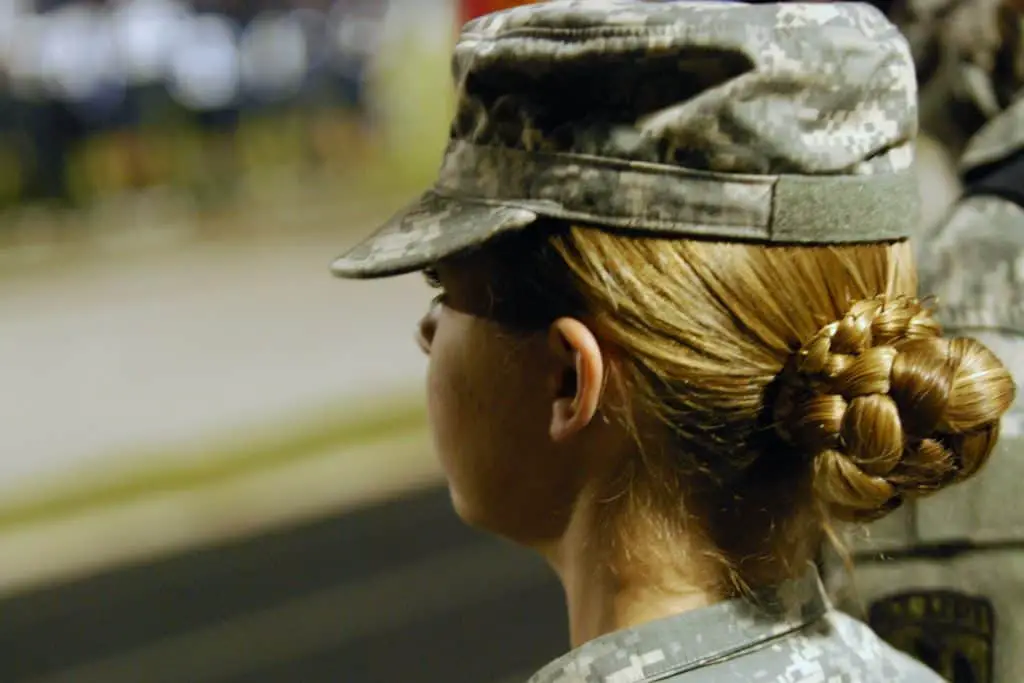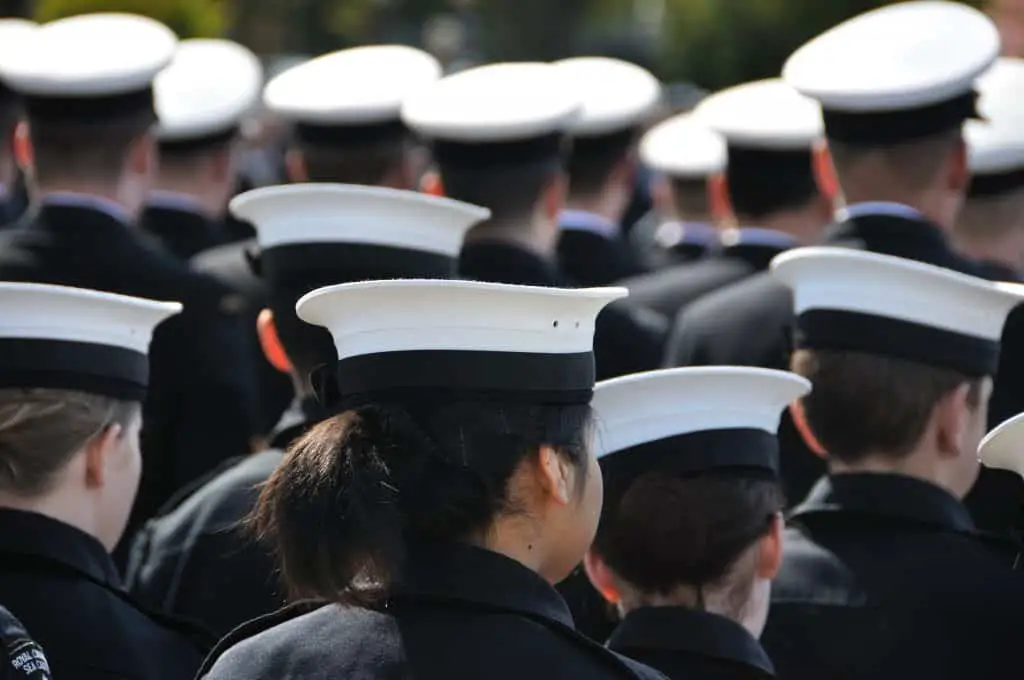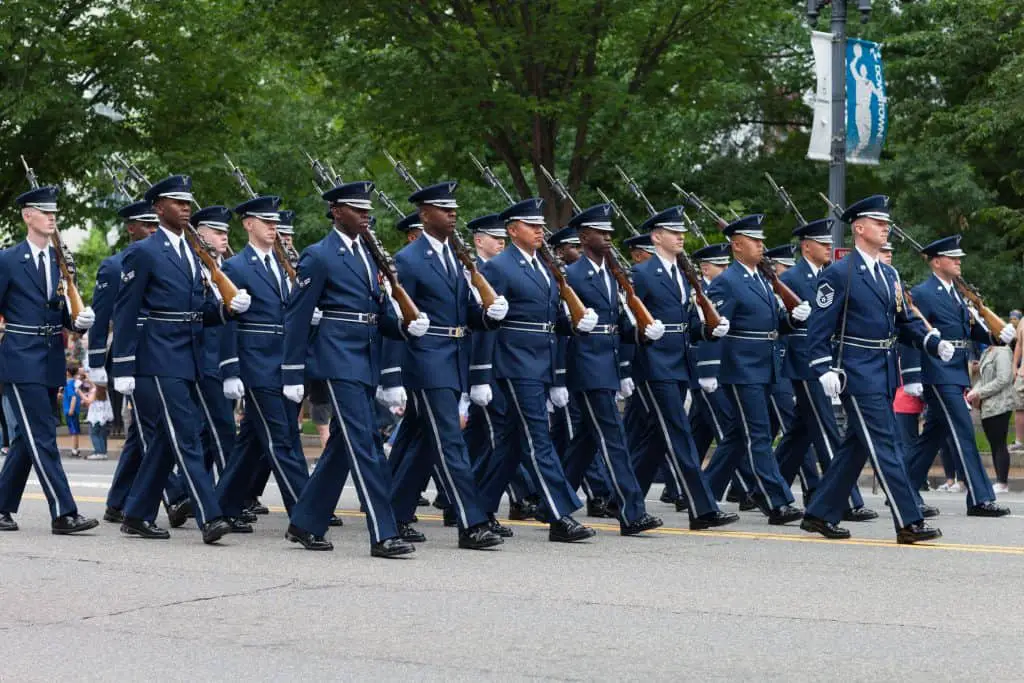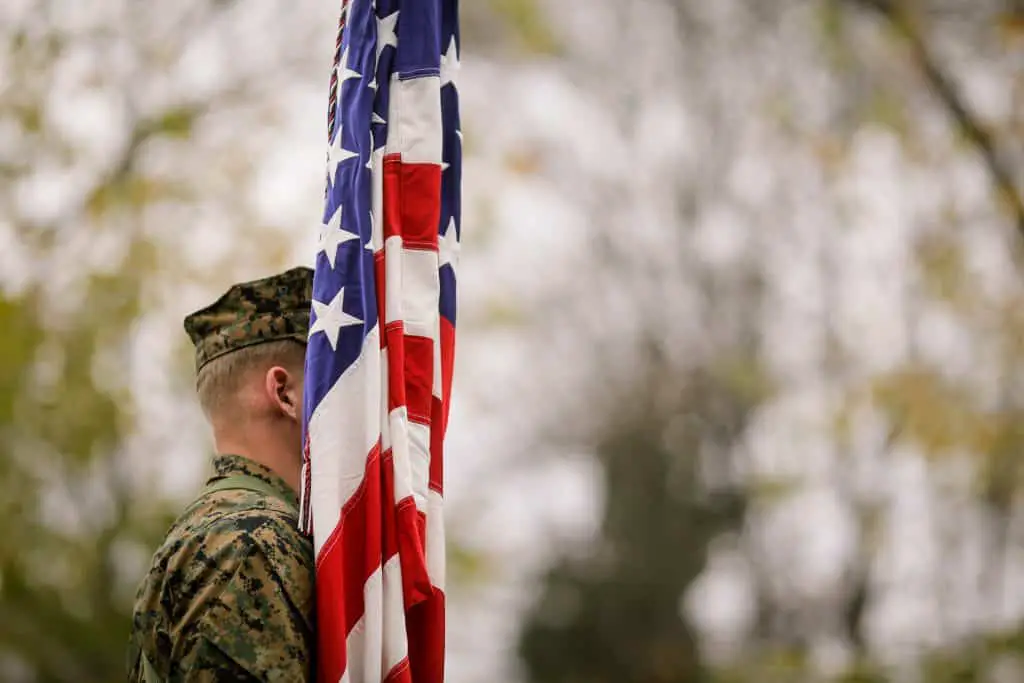Many students are likely aware of the JROTC program when in high school, but there are many more who may not be aware that the program extends beyond that. The ROTC (Reserve Officer Training Corps) is not just something that is offered to high school students, it is largely represented in many universities across the nation as well. In fact, over 1,700 universities in the US have ROTC.
College-level ROTC is a commitment to join a branch of the Armed Forces after you receive your degree. Joining ROTC in college comes with certain benefits such as scholarships, covered tuition, and specialized training that prepares a future cadet for the military and can accelerate ranking.
In this comprehensive guide, we are going to explore everything there is to know about the ROTC program in college. We will look at the basics of the program, its history, what types of colleges offer the ROTC program, rather the program is right for you, frequently asked questions, and much more. Read on to discover more about this beneficial program and the advantages it can bring.
ROTC Basics
The basic and general things to know about ROTC are wide-ranging and filled with many details to where it helps to read a guide like this before considering the program. First and foremost, you have to be serious about pursuing a career in the military as this is the entire point of the program.
With that in mind, there are many benefits that come with ROTC and there are some things to be aware of as far as what type of college has the program. You can also take ROTC in college as an elective if you are just curious about the program. Let’s take a look at 7 basic details about ROTC.
What Does ROTC Stand For?
The ROTC acronym stands for Reserve Officer Training Corps. The “Reserve” means that an ROTC cadet is enlisted as a reserve of the military through the ROTC program but ROTC cadets are not eligible to go to battle or on active duty. The “OTC” acronym stands for the entire training corps of an ROTC program which is to train cadets to become officers in the military.
ROTC is not to be confused with JROTC, which is the junior program of ROTC meant for high school students.

History of ROTC Program
You may be wondering when was the ROTC program established and exactly what services are represented? The ROTC program has a long and successful history that actually was first conceived during the United States Civil War by Alden Partridge, a superintendent at the United States Military Academy in West Point, New York.
Partridge’s idea for the program would receive attention after the passing of the Morrill Land-Grant Acts in 1862 that created land-grant colleges and included Partridge’s idea for military curriculum to be offered at select colleges with Norwich University in Vermont being the official birthplace of the ROTC program.
ROTC would also help lead to the creation of the concept of military reserves or “citizen soldiers,” with the program becoming a great way for those who wished to attend college and also serve their country in the military as well.
In 1916, about a year before the United States entered World War I, the ROTC program was officially created and finalized through the National Defense Act of 1916 with Harvard University implementing the very first and official ROTC program.
The program became so popular that many major universities across America made ROTC a requirement for undergraduates before becoming optional in the 1960s.
Today, the ROTC program is available through the Army, Navy, Air Force, and at select colleges, the Marines which is operated under the Navy division.
What Did the ROTC Vitalization Act of 1964 Authorize?
The ROTC program as we know it today can trace its structure and administration back to 1964. Up until that point, there was a lot of inconsistency in how the program was run; many colleges required it for degree completion, and growing unrest on college campuses across the country caused disruption on campuses administering the program due to rising tensions in Vietnam and the Cold War.
In 1964, following a decline in ROTC enrollment, Congress passed the ROTC Vitalization Act (P.L. 88-647). The Act standardized the program across the Army, Navy, and Air Force, and authorized the department secretaries to pay for ROTC participants’ educational expenses, including tuition, fees, and books.
It capped the number of participants who could receive financial assistance at 16,500 (5,500 for each department). The military departments lifted restrictions on full participation by women in ROTC programs in 1969 (Air Force) and 1972 (Army and Navy). In short, this Act of Congress revamped and evolved the ROTC program to fit with the changing times.
There would be further controversies, specifically in the 1990s surrounding the controversial “Don’t Ask, Don’t Tell” policy passed by the Clinton administration that was finally repealed in 2011, but the Vitalization Act greatly expanded the ROTC program and made it more equitable over time.
ROTC versus Service Academies
You may find yourself becoming confused by the difference between the ROTC program and more generalized service academies. The two things are similar but entirely different as well.
A service academy (also called a military academy) is the equivalent of a four-year college except the academy is either ran by the government or a state with military personnel or, it is one of five academies in the country that is completely administered and controlled by the United States Armed Forces.
Both the curriculum and style of college life at a service academy are highly-regimented and structured to prepare students not only for the military but to also put in the work it takes to become a military officer.
Service academies strive to create an atmosphere and a system that is run according to the requirements of structure and discipline as seen within the Armed Forces. This means that parties, irregular schedules, and even vacation times are not permitted or are much shorter than what is seen in traditional colleges.
A military academy, especially one of the five administered by the government, has a highly selective and competitive selection and enrollment process. But with this in mind, all room and board, tuition, and associated fees are covered if you are selected, and if you graduate successfully, you are automatically commissioned into your chosen branch as an officer with the rank of Second Lieutenant or Ensign for the Navy.
Since the competition and selection process is so fierce, an ROTC program becomes a more attractive option for many.
An ROTC program is similar to a service academy as far as curriculum is concerned, but training is reduced when compared to the four years of a service academy. ROTC cadets will train at intermittent times of the day and can still live a somewhat regular college life. Best of all, if you receive your degree and also successfully complete the program, you will enter your chosen branch as a Second Lieutenant or Ensign as well.
In essence, both a service academy and an ROTC program have the same outcome but are different as far as the experience goes. Being accepted into a military academy is a huge accomplishment, and it can be said that a service academy will give future officers a more immersive military education.
It all depends on which appeals to you the most. Be sure to apply for both service academies and ROTC programs at the same time to ensure all your bases are covered.
ROTC versus OCS
Are you wanting to join a branch of the Armed Forces but you already have a traditional college degree? Officer Candidate School (OCS) is the best option for you. Like most sectors in American institutions and the workforce, the military values a college education.
Not every person wishes to join the military around the age of 18 and not every college student has that goal in mind when planning for their freshmen year and applying for an ROTC program. The military developed the OCS program to fill in these gaps and most branches of the military have either a 12-week or a 17-week OCS program.
But there will be more assessments about your qualifications apart from simply having a college degree. What your degree is in will be looked at as well as all the typical physical and medical assessments. All of this will be explained to you by a recruiter, and the most important aspect to remember is that you still have to be accepted for OCS, much like how having a bachelor’s degree is only a requirement for many careers--your skills are even more important.
Completing an ROTC program removes the need for OCS. The fact that you are earning a college degree is the most important qualifier for attaining the rank of officer, but the four years in the program with the military training and curriculum that you gain automatically gives you the same rank and qualifications as those who complete OCS.
In summary, if you are a college graduate and you did not complete the ROTC program, you can certainly apply for OCS. It is up to you which avenue you take.
Do Community Colleges Have ROTC?
If you are going to community college and you plan on attending a 4-year college to attain the final 2 years for degree completion, you may be able to complete an ROTC program across the 4 years.
Since ROTC programs are designed for 4-year undergraduate universities, there are very few community colleges in the country that have ROTC. But there are systems in place with many community colleges that will allow you to attend for 2 years and also attend the basic program of ROTC (which is the first two years) at a participating nearby university.
You will have to travel back and forth between the two schools each day, but this is the most common system in place for doing all 4 years of an ROTC program if you start with a community college for general education courses.
This also means that your final 2 years will consist of your bachelor’s degree courses and the advanced ROTC program (last two years) at the same time.
Here is a helpful list of all ROTC programs available at 2 and 4-year colleges.

Is ROTC an Extracurricular Activity?
An ROTC program is split into two parts: basic (first two years of college) and advanced (final two years of college). The basic course includes training and electives—including at least one military-related course per semester—during your freshman and sophomore years. If you enroll in the basic course, there is no service obligation.
However, if you accept a scholarship, then there is a service commitment involved. After completing the basic course, you may continue to the advanced course where you will take additional electives and participate in field training.
Furthermore, no matter what your reason for choosing to take ROTC, you can either choose to officially enroll in the program or not enroll and just gain the experience. If you enroll, you can either accept a contract that includes a service commitment and a scholarship that pays for your degree or, choose not to sign a contract and only complete the first two years of the program, making ROTC somewhat extracurricular but you still receive elective credits.
Basically, the only way to complete the final two advanced years of the program is to sign a contract guaranteeing that you will complete a specified number of years in your chosen branch of the Armed Forces.
Therefore, the best way to look at ROTC in terms of being extracurricular is through the first two years of the program but even this is not an after-class activity, these are credit-qualifying elective college courses.
Is ROTC Right for Me?
When it comes to ROTC in college, there are truly only two ways to look at the program. If you truly want to excel in the military and reach the rank of officer upon the completion of your undergraduate degree, the ROTC program is a worthwhile opportunity.
But you may also just want to experience some military training and you like the idea of taking ROTC as an elective.
Either viewpoint is common and in this section, we will go through the specifics of the program to find out if it is right for you.

Pros and Cons of ROTC
Let’s take a look at the pros and cons of the ROTC program.
Pros:
- Officer training. If you complete the program, both the basic and advanced parts, and you receive your degree, you can automatically enter the military as a commissioned officer. This means you can rise through the upper echelons of the Armed Forces branch you have chosen much easier than many entry-level recruits.
- Scholarships. ROTC scholarships are merit-based, and help to cover all or a portion of tuition, fees, and other expenses such as books, and living expenses for two to four years. Typically, qualification for scholarships is based on GPA, test scores, and certain medical and fitness standards.
- You can choose your branch. Based on what is available at various universities, you can choose to either do Army, Navy, or Air Force ROTC programs based on what branch you want to join. Select universities may also have Marine ROTC through the Navy program, and there are even some programs designed for the U.S. Coast Guard.
- You don’t have to commit to a service agreement. Although many students that choose to complete an ROTC program are dedicated to military service, you can also choose to complete only the basic portion of the program if you are interested. You still earn college credits if you do not sign a service agreement and complete all four years of the program.
Cons:
- Increased responsibility. There are disadvantages of ROTC to consider. The primary disadvantage being the increased responsibilities of the program in conjunction with your undergrad studies. Not so much during the first two years but certainly in the advanced portion of the program.
- Commitment stipulations. Continuing into the advanced portion of ROTC brings with it both a commitment agreement and even a contract if you choose to accept one. Signing a contract is a legally binding agreement and deciding not to join the military upon graduation could bring about legal action. This is even more serious if you accept a scholarship and try to drop out of the commitment.
- Military codes of conduct. Many students may not understand that all of the decorum expected of those enlisted in the Armed Forces is still practiced and expected for ROTC cadets. If you make mistakes or fall below the programs or even the university’s standards in this regard, you could be expelled from the program.
Is ROTC a Good Idea?
The ROTC program is a good idea based entirely on what it is you seek to get out of the program.
If you are 100% dedicated to both the military and your college education, then this program is really a dream come true. This allows you to not only avoid putting off getting your degree, but you can also train for the military and even enter your chosen branch as an officer once you graduate. You get the best of both worlds.
f you have ever been curious about the military or taking immersive military courses at the college level, the first two years of the program offer a great opportunity for gaining this knowledge. You can also cover a majority of your elective requirements by completing the basic part of the ROTC program.
On the flip side, ROTC is not a good idea if you come to a crossroads where you want to receive the scholarship or tuition reimbursement but are not really sure you want to join the military. You will have to know without a shadow of a doubt that you want to commit to x amount of years in the military before you accept a scholarship or sign on for the advanced part of the program.
Depending on the administrators of the program and the administrators of your chosen military branch, they could take legal action against you for failing to uphold your commitment. Any scholarships or reimbursements would also have to be paid back.
If you are on the fence, go ahead and enroll in the basic program in your freshman and sophomore years. See how you like it and form a certain opinion before it comes to transition to the advanced section of the program. Definitely make sure you want to be in the military for between 3 to even 12 years before accepting a scholarship.
Is ROTC Worth It?
No matter what path you take with it, ROTC is certainly worth it. From an academic standpoint, the courses allow students to gain knowledge about the inner workings of the U.S. military.
If you commit to the program and want to enter a branch as an officer, this is a great way to accelerate your military career, and scholarships and reimbursement of college expenses could also certainly be in reach.

ROTC and Post-Graduate Education
If you are wondering if ROTC can extend to graduate school or other post-undergrad schools, you will be happy to learn that the answer is yes.
The ROTC program is most commonly understood to be for college undergraduates and this is likely because most people assume you have to complete the ROTC undergrad program to qualify, which isn’t true but it certainly does help in terms of gaining scholarships.
ROTC and graduate school are available through two different trajectories. If you have completed your bachelor’s degree along with the ROTC undergrad program, you can request to continue through graduate school to earn a master’s degree. If you received a scholarship for your advanced portion of ROTC as an undergrad, you can request an additional two years of funding to cover all the costs of your master’s degree.
But this does not always get granted, and your branch may very well require you to complete your commitment in the branch as an officer before releasing you to pursue graduate school. If you are wishing to attend medical or law school, you may get a waiver to delay active duty but proof of admission will be required, and still, there are no guarantees your branch will allow this.
So with this trajectory, it largely depends on what your branch allows you to do.
The second trajectory, and the most common, is for recent college graduates who basically want to do the ROTC program in graduate school. Since a master’s degree is commonly 2 years long, the graduate student will complete the advanced portion of the undergrad ROTC program (junior and senior year). But there are some requirements.
Graduate students will need to complete a course over the summer called Basic Camp that typically lasts about 6 weeks. This accelerated course covers what students missed by not taking all 4 years of the ROTC undergrad program, specifically the 100 and 200 level military training courses.
Successful completion of this course is finalized through a scholarship that you can either accept or decline. The scholarship will cover the cost of your master’s degree, room and board, supplies, and even include a monthly stipend during the two years of your graduate degree. It is important to note that acceptance of the two-year scholarship requires a 4-year service commitment in your chosen branch.
ROTC and graduate school can be confusing topics to navigate. Let’s take a more detailed look at each post-undergrad option and how it relates to ROTC.

ROTC Educational Delay Law School
If you have completed your bachelor’s degree and an undergrad ROTC program and you wish to go to law school, there are several paths you can take.
Graduating from law school and passing the bar examination would immediately qualify a candidate to become a JAG (Judge Advocate Generals Corp) attorney. The Army, Navy, Air Force, and Marines all have JAG lawyers, and all except the Navy and Marines offer a path to become a JAG attorney through the ROTC program.
Let’s take a look at the requirements for education delay for law school of both the Army and Air Force.
Army ROTC Educational Delay Law School
When you reach your fourth and final year of the ROTC program, you will need to report to administrators that you wish to pursue education delay to attend ROTC law school. As long as you have proof that a law school has accepted you, and at least within a few months of the end of senior year, the Army will most likely allow your education delay as either active or reserve duty once you are a commissioned officer.
For active duty, you will be required to serve in the Individual Ready Reserve (IRR) while you attend law school. For education delay with reserve duty, you will be required to complete reserve duty with the Reserves or National Guard while you attend law school.
Keep in mind that you will need to graduate from law school and pass the bar exam to apply into the Army JAG Corps, and you will have to still complete about 4 years of duty to fulfill your agreement for the ROTC scholarship. Tuition and expenses for law school will not be paid for.
Choosing to go to medical school after you graduate college and the ROTC program can be a bit more lucrative than what is offered for law school. All branches of the Armed Forces place a high value on medical doctors and there are possibilities to attend medical school after the ROTC program. Let’s take a look at each branch.
Air Force ROTC Educational Delay Law School
The Air Force ROTC Education Delay Program for Law School is a bit different. It can be said that this is likely due to the Air Force Jag Corps having a reputation as the most prestigious of all military branches.
In the spring of your senior year in the ROTC program for the Air Force, you will have to apply through the program for Education Delay Law School. Your performance, character, grades, and application answers will all be assessed in making the determination.
Additionally, you will have to apply for the JAG Corps Air Force in the third year of law school and the same assessment will be made concerning your grades, performance, character, and social engagement. The service commitment is the same as seen with the Army program and there are no available scholarships to cover law school.
ROTC and Medical School
Choosing to go to medical school after you graduate college and the ROTC program can be a bit more lucrative than what is offered for law school. All branches of the Armed Forces place a high value on medical doctors and there are possibilities to attend medical school after the ROTC program. Let’s take a look at each branch.
Army ROTC to Medical School
Much like with law school, the normal trajectory is to first apply to and be accepted into a medical school a few months before the end of your senior year/program. You also have to time it just right because you have to request an education delay to attend medical school. There are no guarantees the Army will grant the request even if you have been admitted to medical school.
If allowed to attend medical school, you can also apply for the Health Professions Scholarship Program (HPSP). If accepted, this scholarship will pay for your tenure in medical school. This will require a 7 to 8-year service commitment upon completion of medical school.
Air Force ROTC to Medical School
AFROTC has a few unique requirements for cadets wishing to go to medical school. First, a cadet must apply for education delay the start of their junior year, and competition is fierce since only 25 AFROTC cadets across the country can gain entry into AFROTC specialized medical school program.
If you happen to be selected, you will have to ensure that you are accepted into a medical school before the end of the AFROTC program. You can also choose to apply for the Uniformed Services University of the Health Sciences (USUHS) in Bethesda, Maryland and if accepted, you can attend medical school in this prestigious military university dedicated to the health sciences.
If accepted, you will automatically receive the Armed Forces Health Professions Scholarship program which will cover everything except room and board at medical school, but there is also a monthly allowance that can be used to help pay for this.
Navy or Marine ROTC to Medical School
The process for NROTC cadets to request education delay for medical school and by extension, the Marines, is a lot more strict but much the same process as seen with Army ROTC.
ROTC Fine Print
We have already covered the basic part of the ROTC program, so let’s take a detailed look at the advanced portion and particularly the contract requirements associated with the most important part of the ROTC program.
ROTC Contract Requirements
Students can take the first two years of ROTC, known as the Basic Course, with no obligation to contract with the Armed Forces or sign a commitment. For those who decide they want to complete the Advanced Course in the last two years of college, or for those cadets that accepted a 4-year scholarship upon completion of JROTC in high school, a service commitment contract must be signed and a scholarship is typically awarded if it hasn’t been already.
These scholarships range from 2,3, and 4-year scholarships that cover college tuition, books, fees, and living expenses through a monthly stipend. Acceptance of the scholarship means that you will generally have to provide one year of service in your chosen Branch per scholarship year.
Breaking this contract can result in legal action being levied against you as well as the full return of all the scholarship funds.
Is ROTC Stipend Taxable?
In addition to all tuition expenses and college fees being paid with an ROTC scholarship, cadets will also receive a small monthly stipend to help assist with the general cost of living.
This stipend is known as a subsistence payment and all payments of this type are tax-exempt and the payments do not have to be reported on a tax return.

ROTC Questions
When it comes to ROTC there are many frequently asked questions and ROTC tips worth exploring. Here are answers to some frequently asked questions or topics.
Female ROTC
It may sound hard to believe, but up until the early 1970s, women were not allowed to serve in ROTC programs. Thankfully, this is no longer the case and women can enroll in ROTC courses and choose to go through the entire process along with men.
Ivy League ROTC
The very first ROTC program was at Harvard University, but the program’s popularity with the Ivy League has not always been smooth and tightly integrated.
Throughout the latter half of the twentieth century, starting with the Vietnam War in the 1960s and reaching a peak with the passage of “Don’t Ask, Don’t Tell” in 1993, many Ivy League colleges began to remove ROTC programs in protest to military actions. The universities in the Ivy League that kept the programs saw consistently low enrollment numbers each year.
But in the 21st century so far, many universities in the Ivy League are coming back around to ROTC, and especially since the repeal of “Don’t Ask, Don’t Tell” in 2011, and some easing of tensions in the post 9/11, War on Terror era.
Can ROTC Students Study Abroad?
All branches of the ROTC program allow study abroad, although some branches may have different stipulations on this.
Each branch of the military values aspects of global culture and enrichment since there are U.S. military bases all over the world. You will have to clear the trip with your chain-of-command, and depending on the destination, your scholarship or the program, in general, may even pay for the trip.
Can ROTC Students Play Sports?
Yes, ROTC students can choose to play sports in college if they choose. There may be confusions and disagreements over scheduling that collide with training in both fields, therefore, you should always keep an open dialogue with your chain of command and your coach.
Does ROTC Count Toward Service Time?
If you are contracted with ROTC, this is best understood as a service commitment as outlined in the contract. You will automatically be a commissioned officer if you graduate and successfully complete the program, therefore, you are entering the military at a much higher rank, but your overall service time is what is outlined in your contract.
ROTC Haircut
You do not have to keep a crewcut in ROTC but there are hair grooming and length requirements. Your hair should be clean, well-maintained, and never extend past your uniform collar.
For guys, your hair must not appear shaggy or tangled and cannot fall over your ears, eyebrows, or onto or below your uniform neck collar.
For women, the same rule applies but if you have long hair, you can pin it back or pin it, in general, to wear it does not fall over your neck collar.
How to Succeed in ROTC
Succeeding in ROTC all depends upon you. You should be dedicated to the program and always strive to do better if you are critiqued. You should have a positive attitude and outlook, study hard, train correctly, and be dedicated to serving your country through the military.
ROTC and regular college studies can get difficult at times, but dedication and responsibility are the keys to succeeding in the program.

Learn More About ROTC
If you want to learn more about ROTC, be sure to consult ROTC forums, an ROTC study guide for your desired branch, and certainly talk to someone who has gone through the program.
Former ROTC cadets can tell you all about ROTC life, ROTC experience, the disadvantages, and where you may struggle. Make sure you visit the ROTC programs based on your branch by consulting the links below to gain more useful information.
